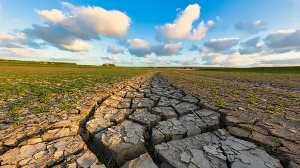 Capacity-building efforts are essential to fostering a deeper understanding of climate issues
Capacity-building efforts are essential to fostering a deeper understanding of climate issues
Deputy Director-West African Science Service Centre on Climate Change and Adapted Land Use (WASCAL), Professor Kehinde Ogunjobi has underscored the critical role of research and capacity-building in boosting Africa’s climate resilience.
Professor Ogunjobi, who doubles as director of research at WASCAL Competence Centre in Ouagadougou, Burkina Faso, stressed the need for countries in the sub-region to fund research and empower citizens to better address climate challenges.
He explained that capacity-building efforts are essential to fostering a deeper understanding of climate issues and ensuring dissemination of solutions at the grassroots level.
Prof. Ogunjobi was speaking in an interview at the final technical workshop on the WASCAL Research Action Plan 2.0 (WRAP 2.0) opening session in Accra, and also encouraged a shift in citizen perception and environmental stewardship.
“We must continue to fund research. Our countries must continue to fund research. We must continue to build capacity. It is very important for us to build capacity. For example, WASCAL has a capacity-building institution in the Gambia where we embark on climate change education. You know, you need to build capacity of people to understand this impact before they go to the end-users and educate.
“Also, citizens must take possession of our environment – we cannot continue to pollute, degrade forests or mismanage water resources,” he said.
He further called on governments to introduce stricter environmental regulations to address these issues, urging citizens to be proactive in maintaining ecosystems; adding that “Our actions today will shape the environment we leave for future generations. It is crucial that we protect and sustain it”.
WASCAL Research Action Plan (WRAP 2.0)
The WRAP 2.0 workshop, held as a key milestone in WASCAL’s mission to become a Climate and Environmental Services Centre (CESC) for West Africa, brought together scientists, stakeholders and policymakers to reflect on the achievements of six climate-related projects.
The about-€3.5million projects, funded by the German Federal Ministry of Education and Research (BMBF), have focused on translating scientific research into practical services that benefit communities and mitigate the effects of extreme climate events such as floods, droughts and heatwaves.
Specifically, the workshop will showcase research and innovative products developed from the different projects, foster multidisciplinary knowledge and information-sharing while exchanging ideas and experiences on climate change adaptation options in West Africa.
According to Prof. Ogunjobi, research has been central to identifying solutions tailored to Africa’s unique challenges.
“Our region is severely affected by extreme climate conditions, making it essential to develop early warning measures to protect livelihoods. WRAP 2.0 bridges the gap between science and community services, ensuring that actionable insights are available to citizens and policymakers,” he noted.
He further explained that the research projects were developed using a bottom-up approach, with extensive engagement at the community level.
“We identified pressing climate issues such as unpredictable rainfall patterns, which impact agricultural practices. From there, we went into the labs to run simulations and produce actionable results. These outcomes are now being shared with end-users to drive national development plans, including Nationally Determined Contributions (NDCs).”
The six projects under WRAP 2.0 focus on diverse areas such as food security, early warning systems and greenhouse gas reduction. One of the notable projects, Green Guide, addresses sustainable agricultural practices and explores ways to enhance crop yield while minimising methane emissions from rice production.
Prof. Ogunjobi highlighted the capacity-building aspect of WRAP 2.0, which has trained numerous PhD and Master’s students.
“Beyond the science, it is vital to equip people with skills to understand climate impacts. WASCAL operates a climate education centre in the Gambia, where future leaders are trained to engage communities effectively.
“African problems require African solutions. It is essential that governments across the region commit to funding research and enhancing capacity. Citizens must also play their part by adopting better environmental practices,” he added.
The Deputy Ambassador-German Embassy, Ghana, Sivine Jansen, also added her voice to the call for concerted efforts toward addressing climate impacts while highlighting the effect of climate migration on livelihoods.
She added that short-term or mid-term solutions are needed in the region to better adapt to climate change – rehashing the need for African solutions to Africa problems.
Deeper collaboration
In an address, WASCAL Executive Director Professor Emmanuel Ramde highlighted how WRAP 2.0 – launched in 2021 – emerged from extensive consultations across 14 ECOWAS countries; saying conversations with farmers, fishermen and vulnerable communities underscored the urgent need for practical, science-based solutions to counter unpredictable rainfall patterns, rising sea levels and environmental degradation.
He commended the tangible results achieved by WRAP 2.0’s six core projects, saying: “By translating research into actionable solutions, we create the resilience needed to safeguard West Africa’s socio-ecological systems”.
Professor Ramde urged participants to build on the momentum generated by WRAP 2.0, calling for deeper collaboration among stakeholders – including policymakers, scientific institutions and governments.
He emphasised the need for sustained investment in climate research and appealed for WASCAL member-countries to remain committed to the institution’s mission.
“Together, we can create the future we want for our region – a future where resilience is built into every village, every city and every ecosystem,” he asserted.